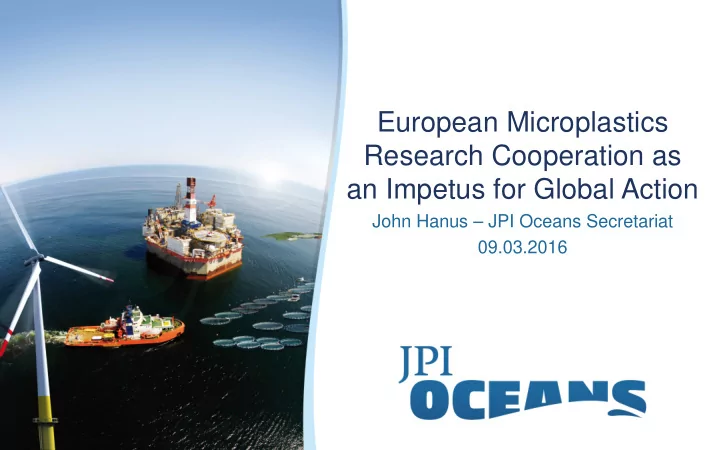

European Microplastics Research Cooperation as an Impetus for Global Action John Hanus – JPI Oceans Secretariat 09.03.2016
What is JPI Oceans? Intergovernmental strategy process, to devise long-term integrated strategies for marine and maritime RTD in Europe . Strategic alignment and coordination of national R&D investments. Open to all EU Member States and Associated Countries with an interest in marine & maritime research. Joint actions – comprising the full range of public research funding instrument – are implemented by those countries willing to participate ( variable geometry principle ). 2 WEDNESDAY, MARCH 09, 2016
22 Participating countries (+ Outermost regions) EC non-voting member Ministries and Research Funders
Plastic in the marine environment Plastics and microplastics are persistent, ubiquitous and have a high potential to cause physical harm and toxicological effect . However: There are a variety of methodologies for identifying and o quantifying plastics – leading to a lack of comparable data ! Relatively little is known about the effects on the marine o environment, and the human food chain. Therefore, 10 member countries (BE, DE, ES, FR, IE, IT, NL, NO, PT, SE) launched a pilot action…
Pilot Action: Ecological Aspects of Microplastics in the Marine Environment Objectives Validation and harmonisation of research methodologies and protocols. o Improving the capacity to identify and quantify microplastics in the marine o environment. Furthering the understanding of the (ecotoxicological) effects of plastic particles o on marine organisms and systems. Implementation Bibliometric study to map microplastics research field 1. Foresight study to identify research needs 2. International scientific experts workshop, 14 - 16 January 2015, Ostend 3. Joint call for proposals in March 2015 with a total budget of approx. 7.5m €. 4 4. projects were selected for funding (21 proposals requesting 26m € were submitted)… 5 WEDNESDAY, MARCH 09, 2016
1. BASEMAN – Defining the BASElines and standards for Microplastics ANalyses in European Waters • Defining baselines for all relevant identification approaches To develop standardized methods for sampling MPs in the water column and • sediments • To provide “best practice” SOPs • To advice stakeholders with respect to MP sampling, detection & analysis Coordinator Gunnar Gerdts Alfred Wegener Institute – Helmholtz Centre for Polar and Marine Research
2. WEATHER-MIC How microplastic weathering changes its transport, fate and toxicity in the marine environment Total budget 1.8 m€ Total JPI-O funding 1.2 m€ Coordinator annika.jahnke @ufz.de
3. Direct and indirect ecotoxicological impacts of microplastics on marine organisms The PLASTOX project will investigate the ingestion, food-web transfer, and ecotoxicological impact of microplastics (MPs), together with the persistent organic pollutants (POPs), metals and plastic additive chemicals associated with them, on key European marine species and ecosystems. Total budget = 3.5 m€ Total JPI Oceans funding = 2.0 m€ Coordinator: Andy Booth (andy.booth@sintef.no) Technology for a better society
4. Objectives To investigate the uptake , tissue distribution and final fate of MPs in representative o organisms To investigate the potential role of MPs as vectors of marine pollutants and their trophic o transfer in marine food webs To assess the effects of microplastics and to test the suitability of exposure and effect o biomarkers to trace MP exposure To provide public and private stakeholders with the scientific basis for existing and new o environmental regulations concerning plastics in the environment To rise public awareness on the risks that less visible plastics pose to marine ecosystems o and, eventually, human health Coordinator Ricardo Beiras University of Vigo 9 WEDNESDAY, MARCH 09, 2016
From European to global action: Marine Litter – A priority of the G7 countries At their Summit in June 2015, the G7 Leaders declared: We acknowledge that marine litter, in particular plastic litter, poses a global challenge, directly affecting marine and coastal life and ecosystems and potentially also human health. ( Leadersʼ Declaration G7 Summit, 7–8 June 2015) In addition, the G7 passed an Action Plan on Marine Litter, which addresses a number of issues, including reduction, removal and further research.
Marine Litter Research: A priority of the G7 and beyond At their October 2015 meeting, the G7 Science Ministers echoed this: Building upon the European JPI Ocean pilot action we, the G7 partners, are reinforcing our international research cooperation and affirm that increased efforts are needed on analytical method harmonisation and eco-toxicological assessment of the effects of plastic waste in the sea, as well as potentially to our food. We would welcome the opening up to G7 countries of existing research initiatives such as the JPI Oceans Pilot actions. (Communiqué, Meeting of the G7 Ministers of Science, Berlin, 8-9 October 2015) The topic has also been on the agenda of the Carnegie Group (G7 + BRICS) and discussions to place it on the G20 Agenda are ongoing.
Concluding Remarks The four funded projects will help us to identify and quantify as o well as understand the fate and effects of microplastics on marine organisms and systems. Such science can provide the knowledge basis that enables o policy-makers to monitor and regulate microplastics. European research cooperation can thereby be the impetus for o further global cooperation on this issue.
THANK YOU John Hanus hanus@deutsche-meeresforschung.de www.jpi-oceans.eu Twitter: @jpioceans
Recommend
More recommend